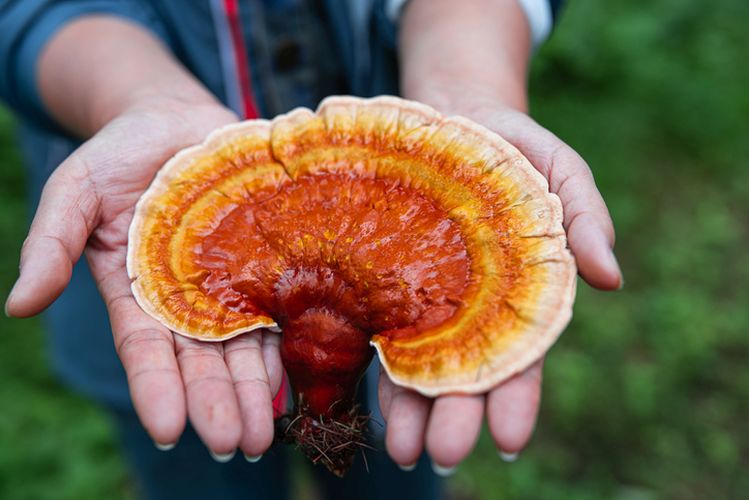Due to their numerous positive health effects, mushrooms have been utilized as a form of medicine for thousands of years. We’re seeing an increase in enthusiasm for these wonderful superfoods now that functional medicine and holistic nutrition are more widely accepted. However, before you head to your neighborhood supplement store, there are a number of factors you ought to be aware of.
The top seven medicinal mushrooms’ health advantages, along with the reasons why certain mushroom supplements on the market today don’t actually contain any mushrooms, are here.
Medicinal mushrooms are nutrient powerhouses, and here are just a few of their many health benefits:
- Improve the immune system;
- are high in antioxidants;
- encourage a healthy inflammatory response;
- assist in maintaining blood sugar balance;
- support brain health and cognition;
- support the neurological system;
- boost vigor and endurance.
Top 7 Medicinal Mushrooms
The healthiest mushrooms to eat as a supplement are:
- Lion’s Mane
- Reishi
- Chaga
- Shiitake turkey tail
- Maitake
- Oyster, Agaricus, and Tremella
The Mushroom For The Mind: Lion’s Mane
Primary Benefits of Lion’s Mane Mushroom for Medicine:
Beta-glucans, which seem to be antioxidants that modulate the immune system and phytonutrients with neuroprotective properties, are only one of the many significant substances found in a lion’s mane. Hericenones and erinacines, which are present in a lion’s mane, might help stimulate Nerve Growth Factor (NGF) production in nerve cells, according to in vitro studies. This is consistent with data from studies on animals showing that a lion’s mane boosts motor function and encourages the formation of nerve tissue.
Furthermore, those who took Lion’s Mane extract had better brain function than the control group who did not take the mushroom, according to a study of elderly people with mild memory problems. All of this suggests that lion’s mane mushrooms are a fantastic aid to sound mental health and may even encourage neurogenesis.
How to Use Lion’s Mane Mushrooms Best in Your Daily Life
To experience the results fully, we advise taking 1/2 teaspoon daily for a while. This powder may be added to your morning coffee, smoothie, or other beverage of choice.
The “Mushroom of Immortality,” Reishi (King of Mushrooms)
When regularly consumed, reishi mushrooms can significantly boost the immune system because they contain polysaccharides linked to immunological function. Additionally, it can promote mental and physical calmness, improve sleep quality, lessen sporadic agitation and anxiety, support lung and respiratory health, and maintain stable blood sugar levels.
According to one study, Reishi can help men with lower urinary tract symptoms (difficulty urinating) by lowering their symptom scale ratings. Reishi is a safe supplement for several cancer treatments and illnesses.
Herbalists refer to reishi as the “King of Medicinal Mushrooms” because of its extensive capacity to support numerous bodily systems.
The Best Ways to Use Reishi Mushrooms Everyday
Surprisingly, a study that looked at commercially available supplements containing reishi mushrooms found that only five of the 19 items looked at could be verified as being genuine reishi mushrooms.
Our reishi product’s black color and bitter taste, both traits of genuine reishi, may be used to determine its purity. It is suggested to take two reishi capsules daily for a while in order to experience the health benefits of this extraordinary medicinal fungus.
Cordyceps Mushroom: The Caterpillar Fungus
The caterpillar fungus is another name for the remarkable, energizing fungus known as the cordyceps mushroom. According to certain research, cordyceps can boost mice’s levels of ATP, the substance that provides cells with energy. This is why cordyceps is an effective mushroom supplement for athletic performance. According to two carefully controlled clinical studies, cordyceps actually improves exercise performance in healthy older adults.
Additionally, preclinical studies on cordyceps in humans, animals, and test tubes show that it promotes normal levels of inflammatory and immunological markers.
Studies suggest that related Cordyceps species may have hormone-regulatory properties that increase sperm viability in men and libido in women. In some groups, cordyceps can help maintain healthy kidney function.
Most Effective Ways to Incorporate Cordyceps Mushrooms into Your Daily Life
Our supplement has no carbohydrates and a generous dose of beta-D-glucans and cordycepin. Adults should consume 1 to 2 teaspoons, or up to 2 grams, of sugar each day over an extended period of time.
The Mushroom That’s Not A Mushroom: Chaga Mushroom
Chaga has been investigated for its potential utility in treating stomach and skin diseases. Chaga has demonstrated positive health effects in more than 200 pre-clinical animal and cell studies, including its high antioxidant content, support for the digestive and immune systems, capacity to reduce inflammation, presence of significant anti-microbial compounds, and adaptogenic properties.
Best Practices for Adding Chaga to Your Daily Life
Adults should take two of our organic Chaga capsules each day. It is best used over a lengthy period of time to see results and may be taken at any hour of the day.
Turkey Tail Mushroom: The Colorful Mushroom
Turkey tail increases the production of cytokines, regulates the activity of natural killer cells, and takes part in other immunostimulatory processes to enhance immune function.
The most immune-supportive substances found in turkey tail are protein-bound polysaccharides (PBP). When used alone or in conjunction with herbs that work synergistically, these PBP substances have the power to improve important immune cell types, such as T cells. In the long run, turkey tail is a safe mushroom to eat when used in conjunction with the right medical attention.
The Best Applications for Turkey Tail Mushrooms Daily
The product is organic and promises to contain only pure mushrooms; no additional starch, mycelium, or grains of any kind (fruiting body) are present. We advise consuming up to 2 grams (1/2 tsp) every day.
The Fragrant Mushroom Is The Shiitake
Shiitake mushrooms are beneficial to the immune system, liver, and cardiovascular system. Shiitake mushroom lentinan, a polysaccharide, has demonstrated considerable potential as an immunostimulant. Shiitake mushrooms have a substance called eritadenine that, according to research, can help keep cholesterol levels that are already within a safe range. By controlling blood sugar levels in the body, the B-vitamin-rich mushrooms make great cooking ingredients and support a healthy inflammatory response.
Shiitake mushrooms have been shown to improve IGA, an important immune cell (immunoglobulin) linked to our body’s main line of defense when it comes to immunity. Shiitake mushrooms can lower the inflammatory marker C-reactive protein (CRP), which is measured in the blood.
How to Best Incorporate Shiitake Mushrooms into Your Daily Life
We advise consuming up to two grams (1–2 tsp) every day. You may take it at any time of day, but you need to use it for at least 6 to 8 weeks to see any changes in your body.
Maitake Mushroom: The Dancing Mushroom
By boosting the immune system’s lymphocytes, natural killer cells, monocytes, and T-helper cells, maitake mushrooms help the immune system operate.
How to Use Maitake Mushrooms Best in Your Daily Life
For at least three months, we advise taking two of our mushroom supplements daily to get the full therapeutic benefit.
Conclusion:
Yes, it was a ton of information. Since the Fungi Kingdom is one of the most diverse assemblages of living things on the planet, this makes sense. Since they have existed for billions of years and predate all terrestrial plants and animals, fungi have evolved to be able to adapt to any environmental circumstance. While performing their crucial role as ecological decomposers, they eat food made from the plant materials they live on. Therefore, mushrooms like lion’s mane, reishi, chaga, cordyceps, turkey tail, shiitake, and maitake offer a range of health benefits. They exchange their capacity for resilience and the biocompounds that they take in from other plants.













